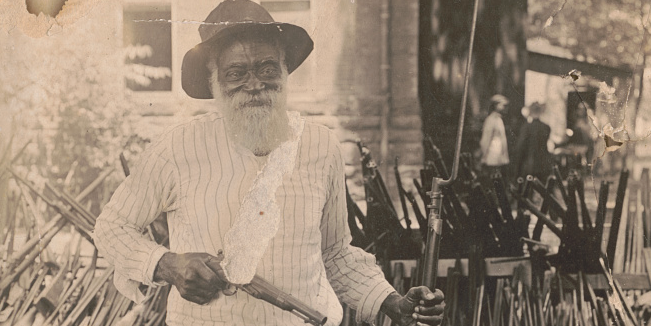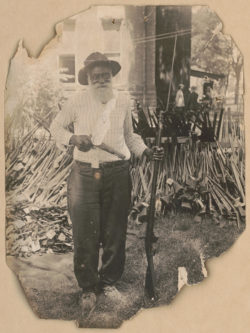
100-Year Anniversary of the Red Summer of 1919
Video Courtesy of WGN News

Daniel Hoskins with guns deposited at the Gregg County Courthouse, in Longview, Texas, following a race riot during the Red Summer. (Library of Congress)
Many people died during the summer and fall of 1919 because of race riots in cities across the country that occurred in more than three dozen cities, including Chicago and a rural county near Elaine, AK. In Chicago, from July 25-August 3, a race riot was ignited when a black teen was stoned to death after crossing an invisible boundary between a segregated part of the Chicago beaches. The riot left 38 people dead, more than 500 injured, and 1,000 black families homeless when their homes were burned down. In Elaine, AK, five whites and twenty-five to fifty Blacks were killed after black sharecroppers attended a farmer’s union meeting to get better pay for their cotton crops. A shooting incident at the meeting escalated into mob violence because of tense racial relations and increasing concern about labor unions at the time, according to The Encyclopedia of Arkansas History and Culture.
Online Resources About the Summer of 1919
A digital archive, map, and timeline of riots and lynchings across the United States in 1919
Chicago 1919: Confronting the Race Riots
The Chicago History Museum and the DuSable Museum Event
The Chicago History Museum and the DuSable Museum of African American History come together to remember the historic events of the summer of 1919. Featuring artists and historians, this event recalls the 1919 race riots that forever changed Chicago’s sociopolitical atmosphere. As we reflect on their tragic legacy, we honor the life of Eugene Williams and others affected by police brutality and segregation.
Meet at Margaret T. Burroughs Beach, 3100 South Lake Shore Drive
Free and open to the public. No RSVPs needed.
SCHEDULE
MCs:
Nancy Villafranca – Chicago History Museum, Director of Education
Erica Griffin – DuSable Museum, Director of Education
3:00–4:15 p.m.
Welcome
Julius L. Jones
Lethal Poetry, After School Matters, DuSable Museum
Momma Kemba as Ida B. Wells
Avery R. Young
Red Clay Dance Company
4:15–5:00 p.m.
FLOAT
FLOAT by Jefferson Pinder and A.J. McClenon is a simple act in the remembrance of the riots of that summer a hundred years ago. Over 100 participants will peacefully drift across a historic invisible racial barrier using inflatables, reactivating and reclaiming a site of violence. While the participants are floating in the lake, at the exact time in which Eugene Williams was stoned to death in the water, a soundscape will draw the participants and the audience into a shared meditative moment.
